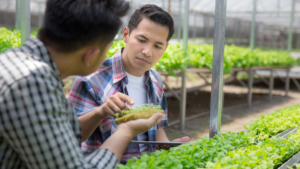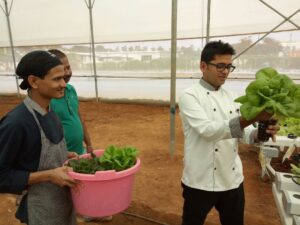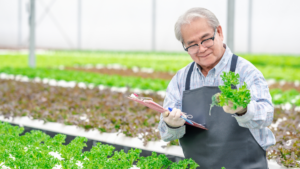The flourishing world of hydroponic farming extends beyond choosing crops; it’s about understanding and meeting the diverse needs of vegetable buyers. In this article, we explore the symbiotic relationship between hydroponic farmers and vegetable buyers, emphasizing the pivotal role these connections play in cultivating success. Beyond the basics of consistent supply, quality, and fair pricing, we delve into an innovative strategy—exclusive arrangements—that has the potential to elevate hydroponic farms into highly sought-after suppliers in the realm of vegetable marketing.
Understanding Buyer Priorities:
Hydroponic farm’s profitability is not only rooted in the crops chosen but in the ability to align with vegetable buyers’ priorities. By discerning the unique needs of various market segments, hydroponic farmers can tailor cultivation practices to exceed buyer expectations in the dynamic field of vegetable marketing.

Consistency for Lower-End Vegetable Buyers:
Budget-friendly restaurants crave reliability in vegetable supply. Cultivating a steady and dependable stream of vegetables becomes paramount for hydroponic farmers targeting this segment of vegetable buyers.
Balancing Act for Mid-Range Vegetable Buyers:
Local grocery stores and farmers’ markets seek a delicate equilibrium between price and quality in vegetable marketing. Hydroponic farmers must optimize cost-effectiveness without compromising on the superior quality that mid-range vegetable buyers desire.
Quality Triumphs for High-End Vegetable Buyers:
Premium outlets, be it upscale restaurants or exclusive retail chains, prioritize quality above all in vegetable marketing. Hydroponic farmers aiming for this market must embrace advanced cultivation techniques and stringent quality control to consistently deliver top-tier vegetables.
Exclusive Arrangements to Boost Profitability:
Identifying Niche Market Opportunities in Vegetable Marketing:
Hydroponic farmers can set themselves apart by identifying vegetable buyers with unique, specialized needs—those searching for uncommon herbs, vegetables, or exotic varieties not readily available in traditional vegetable markets.
Exclusive Agreements for Tailored Vegetable Cultivation:
Enter the realm of exclusive arrangements, where farmers commit to cultivating specific vegetables exclusively for a particular buyer. This partnership involves collaborative efforts, with the buyer providing seeds or cultivation guidelines to ensure a consistent supply of the desired exotic vegetable products.
Premium Pricing for Exclusive Exotic Vegetable Offerings:
Exclusivity allows hydroponic farmers to command premium prices for their specialized and exotic vegetable produce. Vegetable buyers seeking unique and rare produce are often willing to pay a premium for a guaranteed supply of these exclusive offerings.
Mutual Benefits for Both Exotic Vegetable Parties:
Exclusive agreements foster a symbiotic relationship. The farmer gains a guaranteed market for their specialized and exotic vegetables, while the vegetable buyer secures a dedicated and reliable supplier for their unique needs, creating a win-win scenario in vegetable marketing.
Tailoring Vegetable Cultivation Practices for Exotic Produce:
To excel in exclusive arrangements for exotic vegetables, hydroponic farmers must adapt and tailor cultivation practices to meet the buyer’s specific requirements. Fine-tuning nutrient solutions, adjusting environmental conditions, and adopting cultivation methods are integral to delivering on the unique characteristics of the desired exotic vegetables.
Case Study: Exclusive Partnership with a Thai Restaurant Facilitated by Hyperfarms in Bangalore

To illustrate the power of exclusive arrangements, consider the case of Hyperfarms, a leading hydroponic farming solutions provider based in Bangalore, India. Hyperfarms successfully facilitated an exclusive partnership between a Thai restaurant and a hydroponic farm. In this collaboration, the restaurant required herbs like Italian basil, Kailan, and vegetables like winged beans and morning glory. Hyperfarms, as a facilitator, connected the restaurant with a hydroponic farmer, ensuring a seamless integration of the restaurant’s specific requirements into the farm’s cultivation practices.
This mutually beneficial arrangement ensures a dedicated supply of fresh, authentic ingredients for the restaurant’s culinary creations. Moreover, Hyperfarms, being a comprehensive solutions provider, actively assists its customers in marketing and strategizing. This holistic approach not only guarantees a reliable supply of premium produce but also empowers the restaurant with strategic insights and marketing support.
Conclusion:
In the competitive landscape of hydroponic farming, success demands a nuanced understanding of vegetable buyer needs. By prioritizing consistency, quality, and fair pricing, hydroponic farmers can become reliable suppliers in vegetable marketing. Moreover, the integration of exclusive arrangements introduces a new dimension of profitability in the realm of exotic vegetable marketing. Hydroponic farmers can meet the demand for unique and rare vegetables, securing a stable and profitable market. This comprehensive approach underscores the importance of understanding vegetable buyer and exotic vegetable buyer requirements, tailoring cultivation practices for mutually beneficial relationships in the ever-evolving landscape of hydroponic farming, and mastering the art of exotic vegetable marketing.


